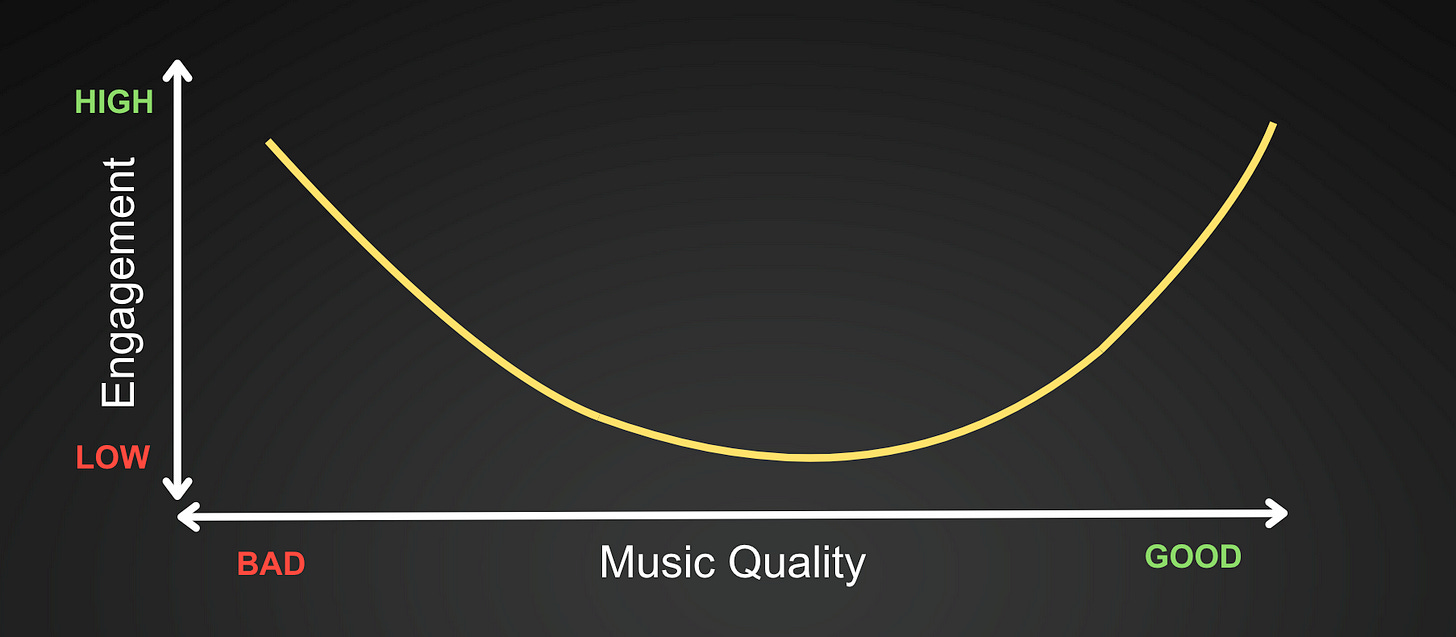Bad Music is Taking Over (thanks algorithms 🙄)
Plus artist names are getting stranger, the festival bubble is bursting and more...
If you’re someone who uses social media as a way to discover new artists you may have seen an increase in the sheer volume of strange, questionable music that’s appearing in your feed.
I’ve seen this mentioned a few times recently and it appears to be becoming a more prominent issue.
A few weeks ago I watched a great video by hadji called ‘The “Bad” Music of Instagram’ which is a decent dive into some examples and what’s going on:
And then a few days ago Anthony Fantano put out a video titled “Instagram Is Torturing Me With The Worst Music” which further shows the sort of content that’s being pushed.
I highly recommend checking out those videos, especially the first one, even if it’s just to get an idea of the type of thing we’re talking about. What we’re seeing here is an example of how algorithms are impacting what sort of music gets exposure on the platforms - and often not for the better.
We all know that engagement is an important metric when it comes to how much virality a piece of content gets. The more people engage with a post, and the more controversial it is, the more attention it attracts.
Music is of course subjective, but the content we are talking about is the stuff that imo 99% of people would place into the ‘bad’ category if they were asked to choose.
The problem with music as a form of content on social media is that there’s a real imbalance between its quality and the amount of engagement it tends to attract. Imagine a metaphorical ‘music quality spectrum’, and you might hope that the relationship between quality and engagement goes something like this:
But in reality, it actually looks a lot more like this:

At the top end of this spectrum, we have artists that have large audiences, and massive social awareness, who can generate high amounts of engagement when they put out new music. Die-hard fanbases, culturally significant releases, these sorts of things tend to pick up enough momentum to break through the noise and make it into people’s feeds.
In the middle we have a massive amount of artists who are creating decent music, very slowly growing their audience, but the content they put out is stuck in a sort of limbo, where they’re not getting enough engagement to break out, and they haven’t quite cultivated a big enough fanbase to move the needle.
Even though these are the sort of artists that we want to see pushed into our social feeds, the reality is the algorithm is stacked against them, with it being made even more difficult to compete due to the rise of the bottom end of the quality spectrum, which is starting to take over.
This ‘bad’ music is so pervasive precisely because of how bad it is. It drives engagement. As hadji mentions - “it’s the reels equivalent of stopping on the highway to watch a car crash”.
As a result, they drive a lot of engagement, with large amounts of (mostly negative) comments and an insane amount of views. The algorithm doesn’t know whether a piece of music is good or bad - it just knows it’s music-related content and it’s getting lots of comments and shares - so it goes and shows this to other people who have expressed an interest in music.
So in a counterintuitive way, the more awkward, cringe-inducing, and tone-deaf you can be, the more likely you are to have your music shared with people on the platform.
With the low barrier to entry, and every artist being told about how important social media is for promoting their music we’ll no doubt see this trend increase.
The one upside to this strange situation is that for now, this exposure doesn’t seem to be translating into engagement on streaming services - with the Spotify numbers for some of these artists nowhere near the levels that they are seeing on socials.
Let’s hope it stays that way 🤞
▶️ Artists Names Are Getting Stranger
An interesting post from Chris Dalla Riva looking at artist names over the years and how formatting, punctuation, and grammar have all changed. Inevitable really with the amount of people now creating music. It all starts to seem normal anyway once you spend enough time online 😆
▶️ California's music festival bubble is bursting
While this post talks specifically about California, it’s a trend I’ve seen discussed a lot this year. A good point raised in this Reddit thread makes a lot of sense - Millenials can afford to go but don’t want to, and Gen Z’s want to go but can’t afford it.



